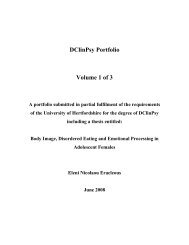PhD thesis - University of Hertfordshire Research Archive
PhD thesis - University of Hertfordshire Research Archive
PhD thesis - University of Hertfordshire Research Archive
You also want an ePaper? Increase the reach of your titles
YUMPU automatically turns print PDFs into web optimized ePapers that Google loves.
fundamentally flawed. Since the application <strong>of</strong> case-case methodology to<br />
infectious disease epidemiology is in its infancy, no consensus on a gold-<br />
standard method for analysis exists currently. It is hoped that the<br />
methodological advances detailed in these studies will inform future case-<br />
case studies.<br />
Case-crossover studies are an alternative approach which could have been<br />
applied at the outset <strong>of</strong> this study (McCarthy & Giesecke, 1999). These<br />
involve capturing information on patients exposures in the incubation period<br />
for a particular disease and comparing these to exposures from a time<br />
outside the incubation period. They therefore employ „control times‟ rather<br />
than „control persons‟ with the patient perfectly matched to themselves. They<br />
obviate the need for ethical approval if conducted within a primary<br />
surveillance framework and are relatively simple to conduct. Ideal in theory.<br />
They assume, however, that the individual has done something „out <strong>of</strong> the<br />
ordinary‟ which has resulted in their disease episode and this assumption is<br />
debatable for Campylobacter infection. Whilst there are documented<br />
instances where a „change from the norm‟ has resulted in campylobacteriosis<br />
(e.g. household illness following the introduction <strong>of</strong> a puppy) it is equally<br />
possible that infection occurs as a result <strong>of</strong> indirect actions in everyday life<br />
(e.g. buying a contaminated sandwich from a sandwich shop where one<br />
routinely buys the same sandwich which has not previously been<br />
contaminated). Furthermore, the incubation period for Campylobacter<br />
infection would impact on the suitability <strong>of</strong> this study design. Firstly, it is long<br />
and therefore the control period would have to be some time prior to onset,<br />
increasing the likelihood <strong>of</strong> recall bias for the „control‟ over the „case‟ period.<br />
Secondly, it is variable, and therefore if the chosen control period is too<br />
recent then it is possible that the illness-causing exposure could be included<br />
in the control period and hence the case would be misclassified as a control.<br />
In the absence <strong>of</strong> a control group, descriptive studies can only tell us so<br />
much about the role <strong>of</strong> particular exposures in disease, and policy makers<br />
and public health practitioners generally require a higher level <strong>of</strong> evidence for<br />
60

















